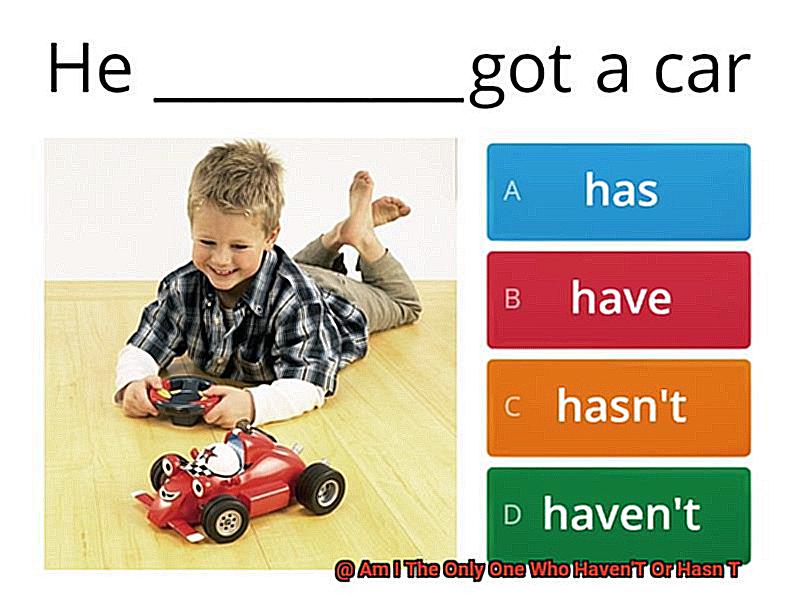
Have you ever had that sinking feeling in your stomach when you see everyone around you doing something cool and you’re just sitting there like, “Am I the only one who hasn’t?”.
It’s like being the last kid picked for dodgeball all over again. But here’s the thing, my friend – you are definitely not alone in this.
In a world where trends come and go faster than we can keep up, it’s nearly impossible to be on top of everything. And that’s totally okay.
So let’s chat about why it’s perfectly normal to be the only one who hasn’t tried or done something.
Am I The Only One Who Haven’T Or Hasn T?
Contents
- 1 Am I The Only One Who Haven’T Or Hasn T?
- 2 Understanding Verb Tense and Subject Agreement with “Haven’t” and “Hasn’t”
- 3 Exploring the Emotional Implications of Using “Haven’t” and “Hasn’t”
- 4 Regional Differences in the Use of “Haven’t” and “Hasn’t”
- 5 Common Phrases That Use “Haven’t” and “Hasn’t”
- 6 The Difference Between “I Haven’t” vs. “He/She Hasn’t”
- 7 When to Use “Haven’t” or “Hasn’t”: A Comprehensive Guide
- 8 Conclusion
It’s a common feeling to think that everyone else has accomplished something or experienced something that we haven’t. This question often stems from comparing ourselves to others and their perceived success or happiness. But why do we feel this way, and how can we shift our focus to self-validation?
The Comparison Trap
In today’s society, we are bombarded with images and stories of people’s achievements and successes. Social media has made it easier than ever to compare ourselves to others and their seemingly perfect lives. We see our friends getting promotions, traveling the world, or starting families, and we can’t help but wonder, “Am I the only one who hasn’t?”
This constant comparison can lead to feelings of self-doubt and inadequacy. We start to question our own worth and accomplishments based on what others have achieved. However, it’s crucial to remember that everyone has their own journey and timeline. What may seem like success for someone else may not align with our own goals and aspirations.
Shifting the Focus to Self-Validation
Instead of seeking validation from others, it’s important to shift our focus to self-validation. We should ask ourselves, “Am I happy with where I am in my life?” or “Am I making progress towards my own goals and aspirations?” This shift in perspective can help alleviate the pressure of comparison and allow us to celebrate our own achievements.
Moreover, self-validation allows us to embrace our individuality and unique journey. We are all different with our own strengths and weaknesses, and comparing ourselves to others only hinders our own growth and happiness.
Seeking Support
It’s also essential to seek support from friends, family, or a therapist if these feelings persist. Talking about our insecurities with someone we trust can be cathartic and help us gain a new perspective. A therapist can also provide helpful strategies to cope with these feelings and build self-confidence.
Understanding Verb Tense and Subject Agreement with “Haven’t” and “Hasn’t”
Have you ever found yourself confused about when to use “haven’t” or “hasn’t” in a sentence? Or maybe you’ve made a mistake and used the wrong contraction with the subject. Don’t worry, you’re not alone. In this section, we will explore the differences between these two words in present perfect tense and how they are used with different subjects.
What is Present Perfect Tense?
Before we dive into the usage of “haven’t” and “hasn’t,” let’s first understand what present perfect tense means. In English grammar, the present perfect tense is used to describe an action that started in the past and is still ongoing or has just ended. It is formed by using the past participle form of the verb “have” with the base form of the main verb.
For example: “I have studied for my exam.” This sentence indicates that the action of studying started in the past and is still ongoing.
“Haven’t” vs. “Hasn’t”
Now, let’s focus on the main topic of this section – “haven’t” and “hasn’t.” These are both contractions of the verb “have” and are used in present perfect tense. The main difference between these two contractions is their subject agreement.
“Haven’t” is used with plural subjects (I, you, we, they) while “hasn’t” is used with singular subjects (he, she, it). This means that if your subject is a single person, animal, or thing, you should use “hasn’t.” If your subject is more than one person, animal, or thing, you should use “haven’t.”
For example:
- Singular subject: He hasn’t finished his project yet.
- Plural subject: They haven’t finished their projects yet.
Negative vs. Just Ended Actions
Another difference between “haven’t” and “hasn’t” is that “haven’t” can also be used to indicate negative actions or situations, while “hasn’t” is usually used for actions that have just ended.
For example:
- Negative action: I haven’t eaten breakfast yet.
- Just ended action: She hasn’t called me back.
Exploring the Emotional Implications of Using “Haven’t” and “Hasn’t”
Have you ever noticed how two simple words, “haven’t” and “hasn’t,” can reveal a lot about our emotions and attitudes towards tasks and goals? These words may seem insignificant, but their usage and context can speak volumes about our mindset and approach to various situations. As an expert on this topic, I will delve into the emotional implications of using “haven’t” and “hasn’t” and provide insights on how we can reframe our thoughts and language to shift towards more positive and empowering attitudes.
Different Verb Tenses, Different Emotions
The use of “haven’t” in present perfect tense (e.g., “I haven’t finished yet”) often conveys a sense of failure or disappointment. It can also suggest a lack of control or responsibility in not completing a task or achieving a goal. On the other hand, “hasn’t” in present perfect tense (e.g., “It hasn’t been finished yet”) may reflect a sense of delay or waiting. This subtle difference in verb tense can reveal underlying emotions and attitudes towards a particular situation.
Mindset and Approach to Tasks and Goals
Our use of “haven’t” or “hasn’t” can also reflect our mindset and approach to tasks and goals. For example, constantly using “haven’t” may suggest a habit of dwelling on past failures, while using “hasn’t” could indicate a tendency to procrastinate or delay taking action. These words can serve as a mirror to our thoughts and beliefs, allowing us to recognize patterns that may be hindering our progress.
Societal and Cultural Influences
Our use of language is also influenced by societal and cultural norms. In some cultures, using “haven’t” may carry a more negative connotation than in others. Similarly, certain industries or professions may have specific expectations and standards for language use, which can also affect our emotional response to these words. It is essential to be aware of these influences and not let them limit our perspectives and attitudes.
Regional Differences in the Use of “Haven’t” and “Hasn’t”
From “ain’t” to “y’all,” the English language is full of unique dialects and regional variations. One particular area of interest is the usage of contractions, specifically “haven’t” and “hasn’t.” As an expert on the topic of regional differences in language, I’ve delved into the nuances of these two words and how they differ across different regions.
American English vs. British English
One of the most noticeable differences in the usage of “haven’t” and “hasn’t” is between American and British English. In American English, “haven’t” is typically used for first and second person pronouns (I, you, we, they) while “hasn’t” is used for third person pronouns (he, she, it). On the other hand, in British English, “haven’t” is more commonly used for all persons and genders. This can be seen in phrases like “You haven’t been to London before?” and “They haven’t arrived yet.”

However, there are also some variations within these general trends. In some dialects of English, such as Australian or New Zealand English, there may be a preference for using “hasn’t” over “haven’t” in all cases. For example, instead of saying “I haven’t finished my homework yet,” one might say “I hasn’t finished my homework yet.”
Regional Differences within Countries
Even within a country, there can be significant differences in the usage of these contractions. For instance, in the United States, there may be a tendency to use “hasn’t” more frequently in Southern dialects compared to Northern dialects. This could be due to cultural influences or historical patterns of language use.
Age and Education
Aside from regional differences, age and education can also play a role in the usage of “haven’t” and “hasn’t.” Younger generations may use “haven’t” more often while older generations may use “hasn’t.” Additionally, those with higher levels of education may tend to use “hasn’t” more frequently. This could be due to the fact that “hasn’t” is considered the more formal variation of the two.
Common Phrases That Use “Haven’t” and “Hasn’t”
These two words may seem similar, but their usage can sometimes be tricky. As an expert on the topic, let’s dive into the different ways these contractions are used and how they form the present perfect tense.”
Role in Expressing Possession or Ownership:
The words “haven’t” and “hasn’t” are contractions of the verbs “have” and “has,” respectively. They are used to express possession or ownership, indicating that someone does not have or own something. For example, “I haven’t seen the movie” means that I do not possess the experience of watching the movie yet.
Forming the Present Perfect Tense:
In addition to expressing possession, “haven’t” and “hasn’t” are also used to form the present perfect tense. This tense is used to describe actions that started in the past and continue to the present. For example, “I haven’t finished my homework yet” means that I started doing my homework in the past, and I am still not done with it in the present.
To make things clearer, let’s break down the different ways these contractions are used:
- Expressing something that has not been done yet or is not completed
- Expressing something that someone else has not done yet or is not completed
- Using in questions
- Informal speech: using “ain’t”
- The phrase “haven’t got”
- Double negatives
Lists:
Here are some examples of how to use “haven’t” and “hasn’t” in different contexts:
Expressing something that has not been done yet or is not completed:
- I haven’t finished my work.
- She hasn’t called me back.
- They haven’t started the meeting yet.
Expressing something that someone else has not done yet or is not completed:
- Haven’t you read the book yet?
- Hasn’t he cooked dinner?
- Haven’t they finished their project?
Using in questions:
- Haven’t you finished your work?
- Hasn’t she called you back?
- Haven’t they started the meeting yet?
Informal speech: using “ain’t”:
- I ain’t going to the party tonight.
- You ain’t seen nothing yet.
- He ain’t got no money left.
The Difference Between “I Haven’t” vs. “He/She Hasn’t”
“Oops, I haven’t finished my homework yet.” “Oh no, she hasn’t arrived at the party.” Sound familiar? These are common phrases we use in our everyday conversations, but have you ever wondered about the difference between “I haven’t” and “He/She hasn’t”? As an expert on the English language, I’m here to break it down for you.
WHAT ARE THEY?
“I haven’t” and “He/She hasn’t” are negative forms of the verb “have” in present perfect tense. This tense is used to talk about actions or situations that started in the past and continue up to the present moment. These phrases indicate that something has not been done or completed yet.
THE MAIN DIFFERENCE
The main difference between the two is the subject. “I haven’t” is used when the speaker is referring to themselves, while “He/She hasn’t” is used when the speaker is referring to someone else. For example, if you say “I haven’t finished my homework,” you are talking about yourself not completing your homework. But if you say “She hasn’t arrived at the party,” you are talking about someone else not arriving at the party.
USAGE AND MEANING
In terms of usage, “I haven’t” is more commonly used in informal conversations, while “He/She hasn’t” is more formal and often used in written or professional contexts. Additionally, “I haven’t” can also be used to express possibility or uncertainty, while “He/She hasn’t” is used to state a fact or certainty.
For example, if someone asks, “Have you finished your assignment?” and you respond with “I haven’t,” it could mean that you have not finished it yet but you might still have time to complete it. However, if someone asks about your colleague’s assignment and you respond with “He hasn’t,” it means that it is a fact that your colleague has not finished their assignment.
GRAMMATICAL FORM
It is important to note that “haven’t” is the contraction form of “have not,” while “hasn’t” is the contraction form of “has not.” When using these forms in writing, be sure to match them with the correct subject pronoun. For example, it would be incorrect to write “I hasn’t” or “He haven’t.”
When to Use “Haven’t” or “Hasn’t”: A Comprehensive Guide
When it comes to using the words “haven’t” or “hasn’t”, many people often get confused about which one to use. They are both contractions of the verb “have not” and are used in present tense to indicate that an action has not yet been completed. However, the key difference lies in the subject of the sentence.
In this comprehensive guide, we will dive deeper into the distinction between “haven’t” and “hasn’t” and provide you with examples of when to use each one. So let’s get started.
Subject Matters:
The subject of a sentence plays a crucial role in deciding whether to use “haven’t” or “hasn’t”. If the subject is singular, then “hasn’t” should be used. For example, “She hasn’t finished her project yet.” On the other hand, if the subject is plural, then “haven’t” is the correct choice. For instance, “They haven’t finished their homework.”
Pronouns also follow this rule. For example, “I haven’t been to Paris yet.” (singular subject) and “We haven’t been to Paris yet.” (plural subject).
Time Frame:
Another factor to consider is the time frame of the action. If the action has not been completed in the past, then “haven’t” or “hasn’t” should be used. For example, “I haven’t eaten breakfast yet.” (the action of eating breakfast has not yet been completed in the past). Similarly, “She hasn’t finished her project.” (the action of finishing the project has not yet been completed in the past).
Negative Questions:
Both “haven’t” and “hasn’t” can also be used in negative questions. For example, “Haven’t you finished your work?” and “Hasn’t she seen the movie yet?” In these cases, they are used to express surprise or disbelief.
In summary, “haven’t” and “hasn’t” are both present tense forms of the verb “have” and are used to indicate that an action has not yet been completed. The main difference is that “haven’t” is used with plural subjects, while “hasn’t” is used with singular subjects. The time frame of the action also plays a role in deciding which one to use.
Conclusion
In conclusion, the constant comparison to others and feeling like we are falling behind can be overwhelming. In a society that glorifies achievements and success, it’s easy to feel like we are not measuring up. However, it’s important to remember that everyone has their own timeline and journey.
The question “Am I the only one who hasn’t?” should not define our self-worth or dictate our accomplishments. Instead, we should shift our focus to self-validation and ask ourselves if we are content with where we are in life and if we are making progress towards our personal goals.
Seeking support from loved ones or a therapist can also aid in overcoming these feelings of inadequacy. As language experts, we have delved into the complexities of using “haven’t” and “hasn’t” in different contexts. From understanding verb tense and subject agreement to exploring the emotional implications and regional differences in their usage, these two words reveal a lot about our mindset and cultural influences.
In summary, whether we use “haven’t” or “hasn’t,” what truly matters is how we perceive ourselves and our journey. Let’s embrace our individuality and celebrate our own achievements without comparing ourselves to others. As the saying goes, “Comparison is the thief of joy.”


